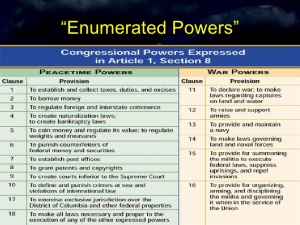It sounds arcane and pedantic, but the United States has a democratic system of government but is not (or at least was not) designed to be a democracy.
A democracy implies that 51 percent of the people have the power to elect a government with unlimited powers to exploit 49 percent of the people.
government with unlimited powers to exploit 49 percent of the people.
The United States instead is a constitutional republic. That means very clear limits on the power of government. And very clear limits, as George Will has properly explained and E.J. Dionne never learned, on democracy.
The bad news is that constitutional limits on the size and power of government have been eroding. The drift in the wrong direction began with Woodrow Wilson and the so-called progressives, accelerated during the New Deal (ratified by the horrible Supreme Court decision in Wickard v. Filburn), and hasintermittently continued in the post-World War II era.
The laughable news (in a sad way) is that some politicians are willing to openly display their ignorance on these matters.
The Washington Examiner reports on (what has to be) the year’s most remarkable example of historical and legal illiteracy.
A House Democrat said Wednesday that it “really bothers me” when people claim the U.S. Constitution was designed to limit the federal government’s power. …Rep. Jerrold Nadler, D-N.Y., said the founding document of the U.S. was designed for the “opposite” purpose. …”The Constitution was enacted to strengthen government power to enable central government to lay taxes and to function effectively…” said Nadler.
Wow.
Talk about claiming that night is day and up is down.
Let’s look at the actual document. Article II of the Constitution makes the President the nation’s Commander-in-Chief, which obviously is important, but otherwise limits the office to an administrator role.
All law-making power is granted to Congress.
 And if you read Article 1 of the Constitution, specifically the enumerated powers in Section 8, you’ll see the areas where Congress has the right to make laws. You get a very clear view that the Founding Fatherswanted very firm limits on the central government.
And if you read Article 1 of the Constitution, specifically the enumerated powers in Section 8, you’ll see the areas where Congress has the right to make laws. You get a very clear view that the Founding Fatherswanted very firm limits on the central government.
Those “enumerated powers” include fewer than 20 specific items, such as “coin money” and “maintain a navy.”
There’s nothing in there about a Department of Housing and Urban Development. Nothing about Medicaid.
And, notwithstanding the elastic anti-constitutional gymnastics of Chief Justice John Roberts, nothing about mandating the purchase of government-approved health insurance.
To be fair, there’s a tiny sliver of truth to Congressman Nadler’s argument.
Compared to the Articles of Confederation (in effect from 1781-1789), the Constitution did give more power to the central government.
But that simply meant that the central government had a very small amount of power compared to a tiny amount of power.
Since I’m a thoughtful and helpful guy, here’s something I created to help Congressman Nadler understand constitutional restraints on the power of government.

This is just a back-of-the-envelope estimate, so I openly admit that I don’t know where to place the current system on this spectrum. We’ve unfortunately traveled a long way on the path to untrammeled majoritarianism in the United States. But voters and politicians haven’t chosen to translate their ability into an all-powerful central government.
In other words, majoritarianism can lead to pervasive statism (i.e., voluntarily electing a communist or fascist government).
But there also are majoritarian systems such as Switzerland where people vote to limit government.
Likewise, monarchies can be benign, such as in the United Kingdom or the Netherlands. Or they can be forms of absolute rule akin to communism and fascism.
For purposes of today’s discussion, though, all that really matters is that both the Articles of Confederation and the Constitution were explicitly designed to limit the powers of the central government.
And while it may upset people in Washington, that means the federal government should be much smaller than it is today. Not only fewer departments, agencies, and programs, but also no involvement in underwear, college football, Major League Baseball, condoms, birth control, or the National Football League.

